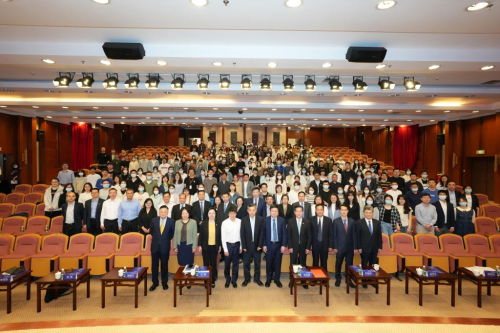
On May 18th, the Gastroenterology Academic Forum and the opening ceremony of SJTUSM Institute of Digestive Diseases were held under the theme of “Collaboration, Innovation, and Reciprocity”. Responding to Healthy China Strategy, the event aims to accelerate the development of world-class university and discipline, and promote the high-quality development of SJTUSM in clinical specialties.
China has always been prioritizing people’s health and advancing the Healthy China Initiative. The increasing societal pressure, altering living environment, and accelerating population aging all lead to the growth of digestive diseases in China each year. Among the top ten high-incidence tumors in China, esophageal cancer, gastric cancer, and colorectal cancer are all related to the digestive system. A higher-level clinical diagnosis and treatment of digestive diseases is crucial to ensuring the people’s health.
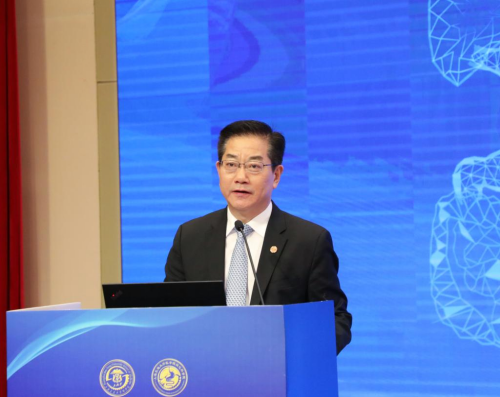
Fan Xianqun, Academician of the Chinese Academy of Engineering and Chancellor of SJTUSM, declared that the accelerating population aging and the increasing incidence of digestive diseases each year have consumed a lot of medical resources. SJTUSM's discipline of gastroenterology has an overall strength and wins a good academic reputation and significant influence at home and abroad. The Institute of Digestive Diseases will integrate the high-quality resources of general hospitals to build strength in specialties, leverage the advantage of SJTU as a comprehensive university to stand out in developing new medical science, creating an innovative platform and strengthening itself in cultivating top talent with a foothold in the SJTUSM's prominence in fostering outstanding talent. The Institute will integrate the strength of the gastroenterology disciplines of the affiliated hospitals and take advantage of SJTU’s technology edge such as 5G, artificial intelligence, big data and cloud computing. Thus, the Institute will innovate cooperation models, promote interdisciplinary communication, comprehensively enhance the gastroenterology disciplines of SJTUSM, and build a first-class benchmark in clinical specialties.
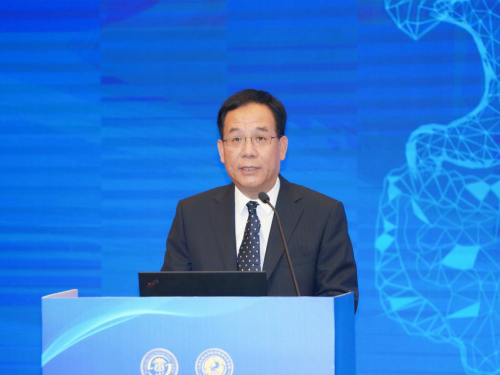
Zhao Wenhua, Deputy Secretary of the CPC SJTUSM Committee, read out the decision on the foundation of SJTUSM Academy of Gastroenterology and the appointment of deans and vice deans. Fang Jingyuan, vice president of Renji Hospital, serves as the dean of the Institute. Lu Lungen, head of Shanghai General Hospital's Gastroenterology Department, and Zou Duowu, director of Gastroenterology Department of Ruijin Hospital, serve as the vice deans of the Institute.
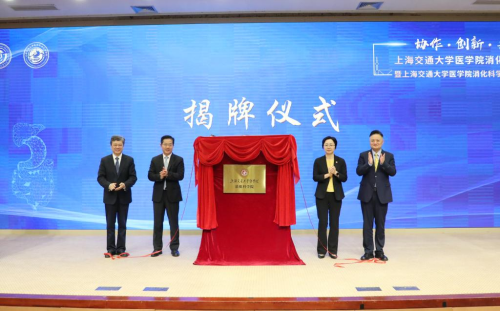
At the ceremony, Jiang Fan, Secretary of the CPC SJTUSM Committee, Fan Xianqun, Academician of Chinese Academy of Engineering and Chancellor of SJTUSM, Zheng Junhua, Secretary of the CPC Renji Hospital Committee, and Xia Qiang, President of Renji hospital, jointly unveiled the foundation of the Institute of Digestive Diseases of SJTUSM.
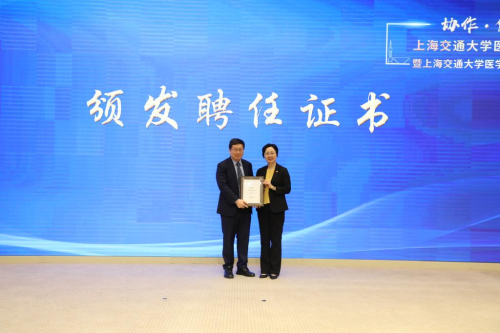
Jiang Fan, Secretary of the CPC SJTUM Committee, handed the certificate to Fang Jingyuan, Dean of the Institute of Digestive Diseases.
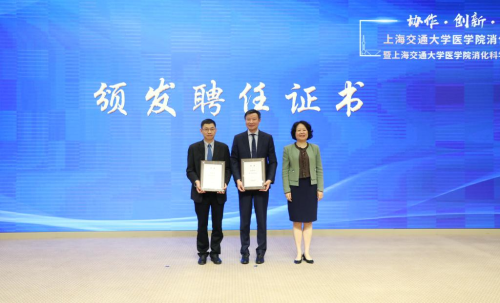
Shi Jianrong, Deputy Secretary of the CPC SJTUSM Committee, handed certificates to Zou Duowu and Lu Lungen, Vice Deans of the Institute of Digestive Diseases.
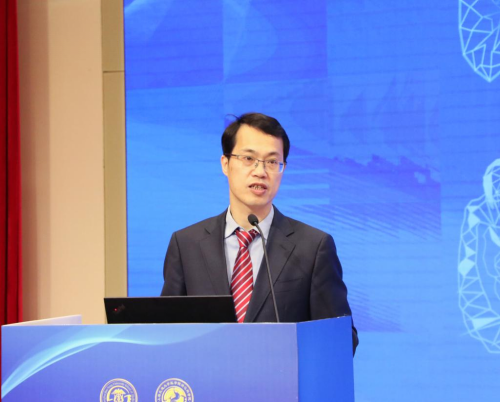
Zheng Junke, Vice Chancellor of SJTUSM, presided over the opening eremony.
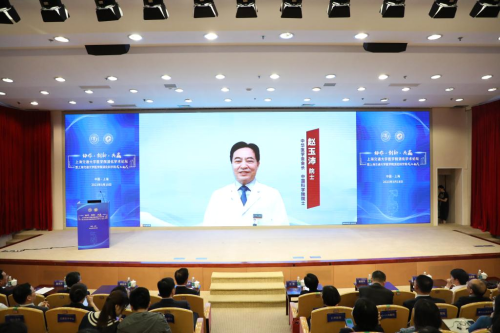
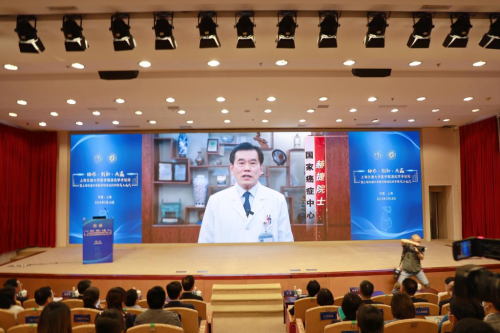
Zhao Yupei and He Jie, Academicians of the Chinese Academy of Sciences, congratulated the foundation of the Institute of Digestive Diseases of SJTUSM in a video. They hope that the Institute will continue to explore and build a new model to develop high-level specialties as a leader to join the world's first-class ranks.
Digestive diseases, as common and frequently-occurring clinical diseases, endanger the people's health. In particular, the early diagnosis and precise treatment of digestive system tumors and precancerous diseases urgently require the development and innovation of new technologies and methods. SJTUSM has made pioneering explorations, conducted prospective studies and took practical measures in the early diagnosis and precise treatment of digestive diseases, especially the screening and treatment of digestive tract tumors. In the new round of strategic planning and layout, SJTUSM will integrate the advantageous strength and characteristic resources of each affiliated hospital and build specialty schools accordingly based on the consolidated concept of discipline.
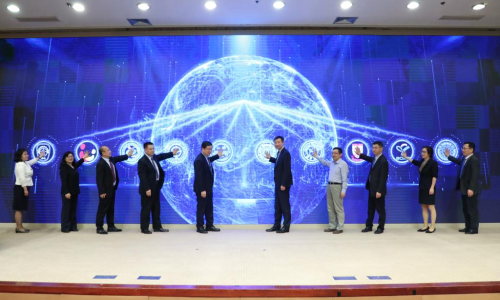
At the opening ceremony, representatives of the Gastroenterology Department of Renji Hospital, Ruijin Hospital, Shanghai General Hospital, Xinhua Hospital, Shanghai Ninth People's Hospital, Shanghai Sixth People's Hospital, Shanghai Children's Medical Center, Children's Hospital of Shanghai, Tongren Hospital and Songjiang Hospital jointly launched the academy emblem.
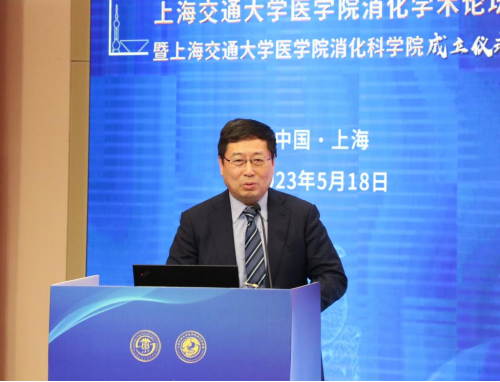
Fang Jingyuan, Dean of the School of Gastroenterology, declared in the construction plan that the Academy will focus on the international frontier and the people's health. Centering on the major clinical research, diagnosis and treatment, cutting-edge concepts and common technologies in preventing and treating digestive diseases, the Academy will organize and combine scientific research to tackle difficulties. The Academy will enhance the transformation of scientific and technological achievements, and actively promote the interdisciplinary communication between medical engineering and medical science. Moreover, the Academy will attach importance to scientific research in artificial intelligence and microbiology and more fields while striving to make achievements and breakthroughs in clinical technology that will bring significant influence and original ideas. By fully integrating the resources of SJTUSM and the affiliated hospitals, the Academy will build a specialized school combining medicine, teaching, and research. The Academy will establish a new model of high-level discipline development. It will improve the overall quality of education and teaching, range of talent, innovation of scientific research, and level of medical services, thus leading the development of gastroenterology in China.
SJTUSM faces the frontiers of world science and technology, focuses on key medical issues, and carries out innovative research and combines forces to tackle problems. High-level research platforms of Shanghai Immune Therapy Institute, Shanghai Institute of Virology, Songjiang Institute, Institute of Digital Medicine, Institute of Biomaterials & Regenerative Medicine, and Institute of Medical Equipment and Technology have been set up successively. The foundation of the Academy of Gastroenterology marks that the discipline of Gastroenterology of SJTUSM has entered a new stage of accelerated development. In the future, the Academy will implement the Healthy China Strategy and contribute to the new development of China’s health undertakings by sharing SJTUSM wisdom and offering plans designed by Shanghai.
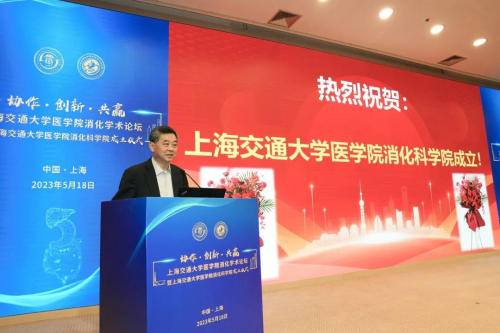
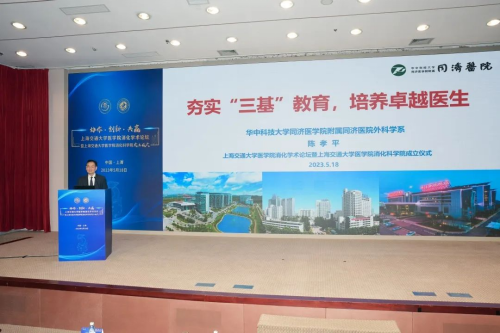
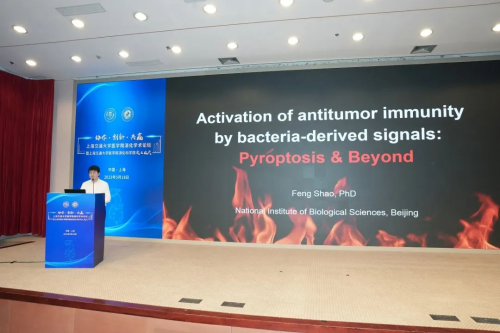
After the opening ceremony, the summit forum themed “Collaboration, Innovation, and Reciprocity” was held. Li Zhaoshen, Academician of the Chinese Academy of Engineering, Chen Xiaoping, Academician of the Chinese Academy of Sciences, and Shao Feng, Academician of the Chinese Academy of Sciences, delivered keynotes on the eight-year experience of early screening, diagnosis and treatment of digestive tract cancer in China, consolidating the “three basics” (concept, knowledge, and skill) education to cultivate excellent doctors, bacteria and anti-tumor immunity and other topics. They shared ideas of the cutting-edge academic achievements and latest trends of gastroenterology.

